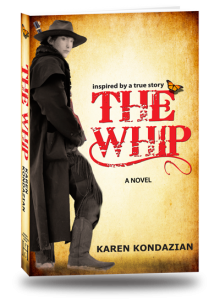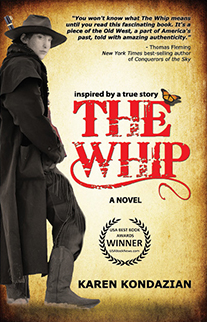The cafe interview: novelist and actor Karen Kondazian
by Art Kusnetz
The Petaluma River was rising and the rain and wind made the old railroad trestle beneath our window tremble. I was glad we were inside and warm as I sat with actor and author Karen Kondazian. We were talking about her novel The Whip, which chronicles the life of Charley Parkhurst, one of the best “Whips”—stagecoach drivers—that Wells Fargo ever had. Upon his death, a great secret was revealed, he was a she!
As we ordered our café fare, I asked what first drew her to the story of Charley Parkhurst.
“I first discovered Charley in the 1980s. I immediately felt connected to her and her story on a very personal level. I can’t explain it except to say that I felt like a channel, a voice for Charley. Certainly the dialog flew out of me like I was channeling her, but then I really feel that artists are channels. That’s what actors do, that’s what writers, painters and sculptors do. I was the modern voice for Charley. And what I got from Charley’s life is that everything is on loan in our lives— even the people we love. So always remember to say goodbye. The key to the ending came to me during meditation when I realized she didn’t want to die alone.”
There’s talk of making “The Whip” into a movie. How do you feel the theme of a woman having to emulate men in order to survive will resonate with modern audiences?
 “I think the theme will always resonate as long as women are not in an equal position with men in areas of power and money. There are certainly still places in this country where traditional roles are more prevalent, which would look at any woman who places career ahead of family as eccentric, odd or someone to be feared. And although we aren’t limited to career paths like nurse, teacher or prostitute like in Charley’s time, we still make less money, hold fewer positions of power and worry about our physical safety more than men do. Even in Hollywood where some parity exists for actors, that other evil, ageism, rears its head. With few exceptions it’s okay for men to have wrinkles but for women it’s the knife”.
“I think the theme will always resonate as long as women are not in an equal position with men in areas of power and money. There are certainly still places in this country where traditional roles are more prevalent, which would look at any woman who places career ahead of family as eccentric, odd or someone to be feared. And although we aren’t limited to career paths like nurse, teacher or prostitute like in Charley’s time, we still make less money, hold fewer positions of power and worry about our physical safety more than men do. Even in Hollywood where some parity exists for actors, that other evil, ageism, rears its head. With few exceptions it’s okay for men to have wrinkles but for women it’s the knife”.
I should add that Karen has had extensive experience on stage and in movies, including playing Maria Callas in Master Class.
Do you feel that there was ultimately resolution and redemption for Charlotte “Charley” Parkhurst?
“Only in death was there redemption. She lived amidst a vast underground river of revenge. If someone took everything away from you could you forgive them? No! Not just in Charley’s time but in ours as well. We are living in a time of revenge. For Charley, redemption comes when she’s taking her last breath, between the inhale, life, upon the exhale, redemption. This is the reason the story resonated with me, this Medea-like rage which lives inside me and which I credit for making my roles so powerful. It feels like I’m holding down a volcano. This is what I imagined Charlotte felt—the rage which drove her to dress in men’s clothing, to seek revenge against those who cost her so much and to ultimately become so comfortable with that identity as to become Charley Parkhurst.”
“It is a survivor’s tale, one that parallels each of our own lives. All of us are survivors—to live in this world, to survive emotionally—that’s the trick. I know it sounds ‘new age’ to just change your mind about how you look at something. That’s how I survive and I believe it’s how Charley survived.”
It was still raining when we left the café but the air and the energy felt different. Maybe Charley was right; it’s all in how you choose to look at life.
.pdf for download
Art Kusnetz is a freelance journalist who lives in Petaluma
Karen Kondazian will be reading and signing The Whip at Book Passage in Corte Madera on February 25, 2012










Speak Your Mind